For some jobs, you can do it by relying only on your skills, physical strength or imagination. SEO tools marketer is not one of those jobs.
In the digital age, marketers like me cannot do their jobs without the right tools; tools that help us monitor performance, diagnose problems, report improvements, report progress, and do the little things we don’t have. A time when work was done hundreds of times a day.
one
I reviewed tons of SEO software options (including ones I use regularly) to find what I think is the best SEO tools. This is what I see.
- seoClarity: An SEO artificial intelligence tool
- Surfer:AI Fusion
- Semrush: for SEO Ranking Tracking
- SEOptimer: for SEO audit
- Ahrefs: for competitive research
- Clearscope: for SEO content optimization
- Letterdrop: for SEO content automation
- BuzzSumo: for SEO content ideas
- AnswerThePublic: for financial research
Imagine you’re an SEO detective! Here’s your toolkit to improve your website’s ranking in search engines:
- SEO Audit Tools: Inspect your website like a detective looking for clues to improve its SEO.
- Keyword Research Tools: Discover what people are searching for online, like figuring out what a crime scene witness might be looking for.
- Rank Trackers: Monitor your website’s ranking over time, like keeping track of a suspect over days.
- All-in-one Tools: The ultimate SEO toolkit with everything you need, but can be expensive (like a high-tech detective gadget with a hefty price tag).
The best SEO tools at a glance
| Best for | Standout feature | Pricing | |
|---|---|---|---|
| seoClarity | An SEO AI assistant | Native generative AI assistant | Custom |
| Surfer | AI integration | AI-powered content and SERP insights | From $89/month |
| Semrush | Rank tracking | Modular dashboards | From $129.95/month |
| SEOptimer | SEO audits | Actionable diagnostic recommendations | From $19/month |
| Ahrefs | Competitor research | Content Gap tool | From $99/month |
| Clearscope | Content optimization | AI-driven content optimization | From $170/month |
| Letterdrop | Scaling SEO content creation | Video-to-post automation | By request |
| BuzzSumo | Content ideation | Content Generator tool | From $199/month |
| AnswerThePublic | Content research on a budget | Unique keyword data grouping | From $9/month |
1. SeoClarity
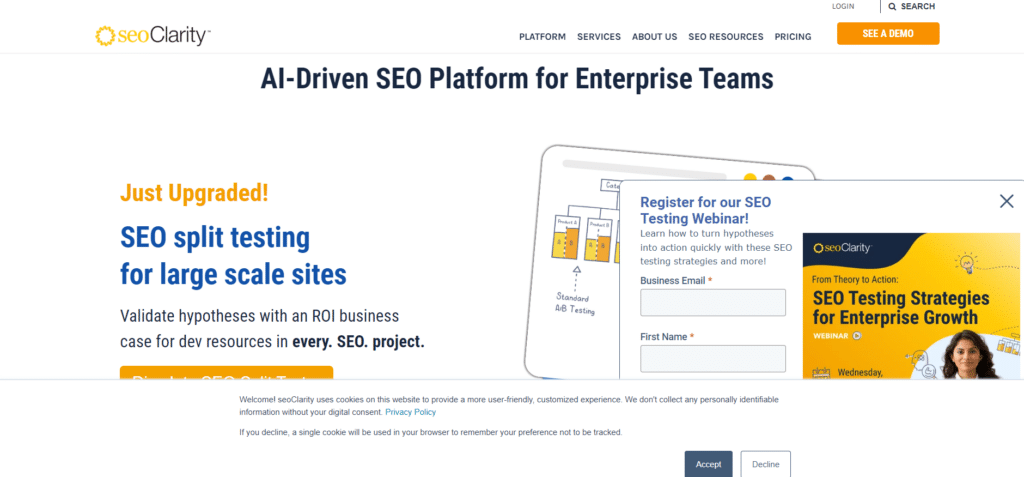
seoClarity isn’t your average SEO tool. It’s a comprehensive suite aiming to be your one-stop shop for all things search engine optimization.
SEO tool category: All-in-one
Key Features:
- Rank Tracking: Monitor how your website ranks for specific keywords over time.
- Competitor Analysis: See what your competitors are doing well in SEO and identify areas to outrank them.
- Keyword Research: Discover relevant keywords to target in your content strategy.
- Content Optimization: Analyze and optimize your content for better search engine visibility.
- Technical SEO Audits: Uncover technical issues on your website that might be hindering your SEO performance.
- Content Creation Tools: Help you brainstorm content ideas, optimize content for SEO, and even create content briefs.
Pros:
- All-in-one SEO Suite: Combines features from various SEO tools for rank tracking, competitor analysis, keyword research, and content optimization.
- AI Assistant (Sia): Get help creating content outlines, titles, descriptions, and even full sections with the help of Sia, their AI writing assistant. Think of it as a supercharged grammarly on steroids.
- Content Creation Tools: Build content briefs and leverage Sia to write content based on your keywords.
- Technical SEO Audits: Identify and fix technical issues on your website that can hurt your SEO performance.
Cons:
- Pricey: Be prepared for potentially high costs, especially for mid-tier plans. Pricing isn’t always clear for the most basic and advanced plans either. This is by far the most expensive option on this list.
- Complexity: The wide range of features can be overwhelming for beginners. It might take time to learn the ropes.
Who is it for?
Great for businesses with dedicated SEO teams, complex for beginners. Think of it as a Swiss Army Knife of SEO – lots of features, but expensive and requires some training to master.
2. Surfer
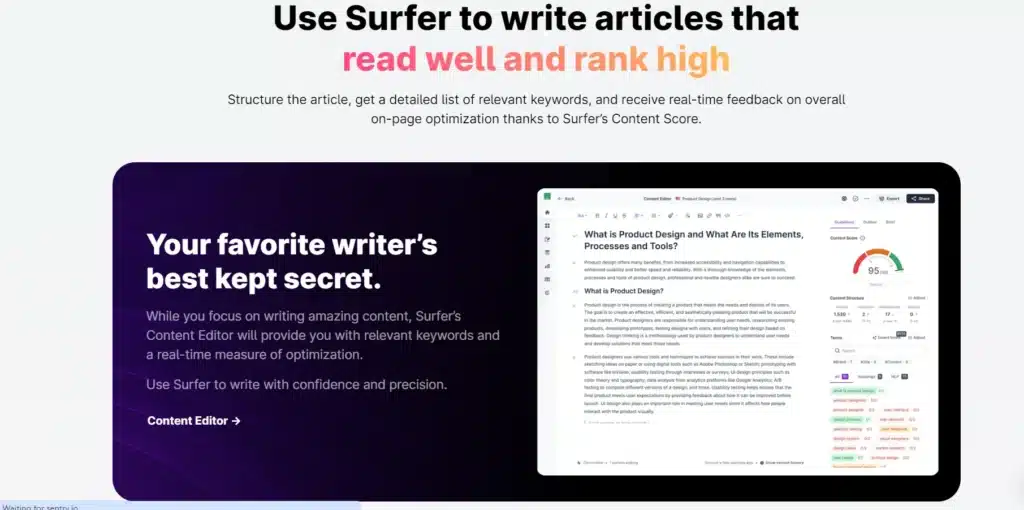
Surfer stands out as a cloud-based SEO tool designed to help you optimize your written content for search engines. It tackles a specific task within the larger SEO world: making your content rank higher in search results.
Key Features:
- Content Editor: Analyze and optimize content directly within the Surfer interface. You can write content from scratch or optimize existing content based on insights.
- SERP Analyzer: Analyze the top-ranking web pages for your target keyword, uncovering valuable data on content structure, word count, readability, and more.
- Content Audit: Get a comprehensive audit of your website’s content, highlighting areas for improvement across multiple pages.
- Keyword Research: Find relevant keywords to target in your content strategy.
Pros:
- Actionable Insights: Surfer provides clear and actionable recommendations to optimize your content for search engines.
- Data-Driven Approach: Backs its suggestions with data from real top-performing content.
- Content Editor Integration: Streamlines the optimization process by allowing you to write and optimize within the same platform.
- Content Audit Feature: Provides a valuable overview of your website’s content health and areas needing attention.
Cons:
- Focus on On-Page SEO: Primarily focuses on on-page SEO optimization and might not cover aspects like link building.
- Limited Free Plan: The free plan offers restricted features. Upgrading unlocks the full potential of Surfer.
- Learning Curve: While user-friendly, using Surfer effectively might require some time to learn its functionalities and interpret the data.
Who Should Use Surfer?
- Content Creators: Optimize blog posts, articles, and other content for search engines.
- SEO Professionals: Refine existing content and develop data-driven content strategies.
- Website Owners: Improve the overall SEO health of their website’s content.
3. Semrush
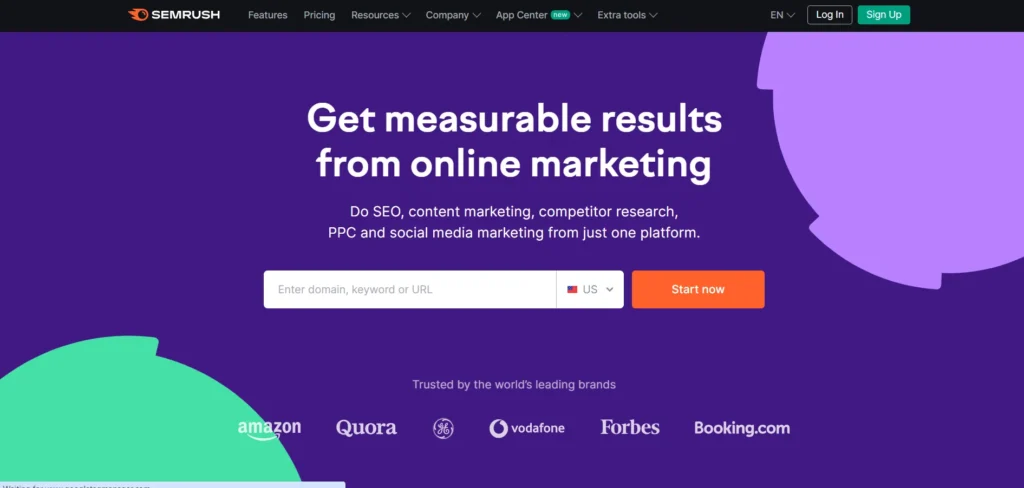
Semrush is a well-known all-in-one SEO platform designed to be your SEO battle axe. Here’s a quick rundown:
SEO tool category: Rank tracker
Key Features:
- Rank Tracking: Monitor your website’s ranking for targeted keywords.
- Competitor Analysis: See how your competitors stack up in SEO and identify opportunities to outrank them.
- Keyword Research: Discover relevant keywords to target and analyze their search volume and difficulty.
- Content Marketing Tools: Create and optimize content for search engines, including content planning and topic research.
- Backlink Analysis: Identify your backlinks (links from other websites to yours) and those of your competitors. Backlinks are a crucial SEO factor.
- Technical SEO Audits: Uncover technical issues on your website that can hurt your SEO performance.
Pros:
- Powerful All-in-One Suite: Offers a vast range of SEO tools under one roof, making it convenient to manage various SEO tasks.
- Detailed Data & Insights: Provides in-depth data and reports to inform your SEO strategy.
- Backlink Analysis: Backlink analysis is a strong point, helping you understand your website’s authority and identify link-building opportunities.
- Content Marketing Tools: Offers features beyond just on-page SEO, assisting with content strategy and creation.
Cons:
- Pricey: Similar to seoClarity, Semrush can be expensive, especially for larger businesses needing advanced features.
- Complexity: The vast number of features can be overwhelming for beginners. There’s a learning curve involved.
- Limited Free Plan: The free plan offers restricted features, hindering its usefulness for serious SEO efforts.
Who Should Use Semrush?
- Marketing Agencies & Freelancers: If you manage SEO for multiple clients, Semrush’s all-in-one features can streamline your workflow.
- Businesses with Dedicated SEO Teams: Companies with in-house SEO expertise can leverage Semrush’s extensive data and tools.
4. SEOptimer
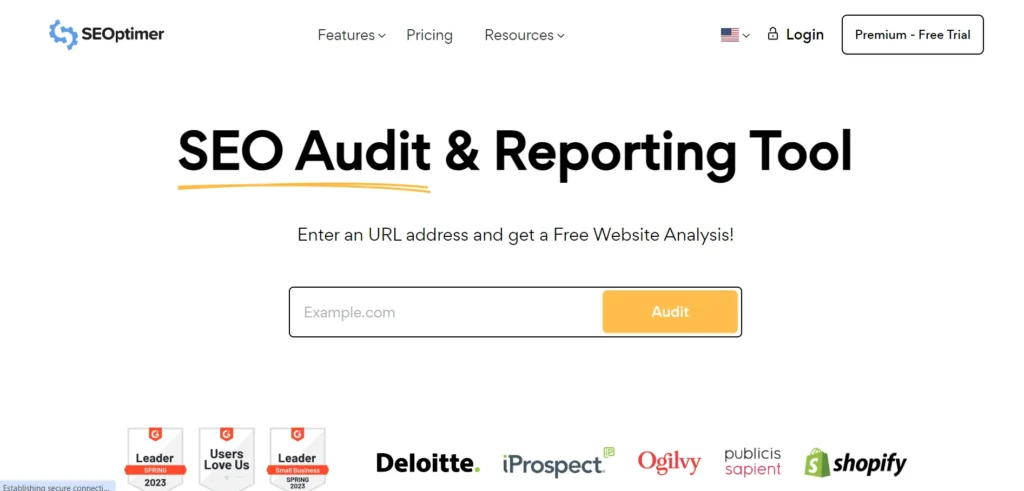
seoptimer Free SEO checkup tool to identify basic website improvements, ideal for beginners on a budget.
SEO tool category: SEO audit
Key Features:
- Free SEO Website Audit: Analyze your website’s SEO health in under 30 seconds.
- Actionable Recommendations: Get suggestions to improve on-page SEO (title tags, meta descriptions, internal linking).
- Backlink Analysis: See your backlinks (links from other websites) and Moz Domain Authority (potential ranking power).
Pros:
- Free & Fast: Get a basic SEO checkup without any cost, with results in under 30 seconds.
- Simple & Easy to Understand: Clear, grade-based report that’s easy to interpret, even for SEO beginners.
- Actionable Tips: Provides practical suggestions to improve your website’s on-page SEO.
Cons:
- Limited Scope: Focuses on basic on-page SEO and backlinks. Doesn’t offer features like rank tracking or competitor analysis.
- Free Version Limitations: Upgrading unlocks more in-depth analysis and tools.
Who is it for?
- Website Owners & Bloggers: Get a quick and free snapshot of your website’s SEO health.
- SEO Beginners: Learn the basics of on-page SEO and identify areas for improvement on your website.
5. Ahref
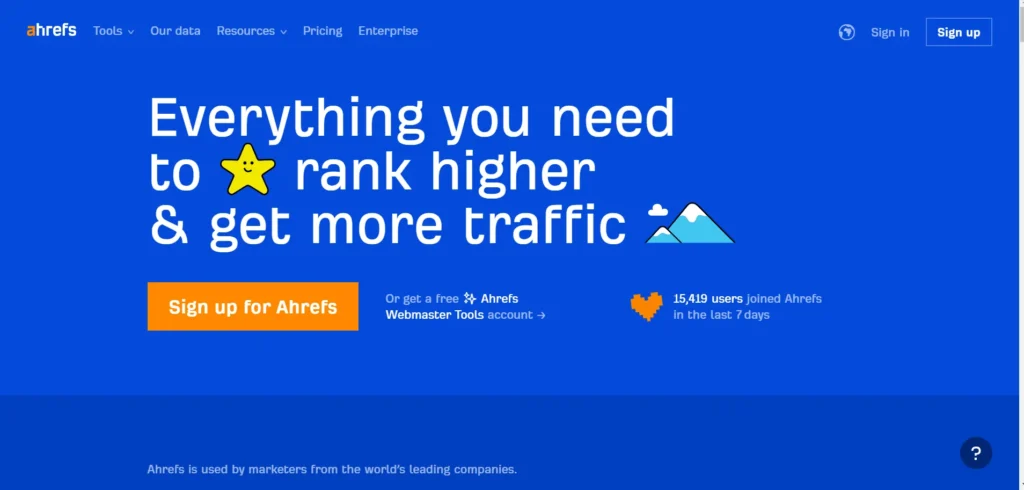
Ahrefs: Powerful SEO all-rounder, known for its in-depth backlink analysis. Great for agencies and businesses with serious SEO needs, but can be expensive for beginners.
SEO tool category: Rank tracker
Key Features:
- Extensive Backlink Analysis: Uncover your website’s backlinks and those of your competitors, a crucial factor in SEO.
- Keyword Research: Discover relevant keywords, analyze their search volume and difficulty, and find content gaps to target.
- Rank Tracking: Monitor your website’s ranking for targeted keywords over time.
- Content Optimization: Analyze and optimize your content for better search engine visibility.
- Competitive Analysis: See how your competitors are performing in SEO and identify opportunities to outrank them.
Pros:
- In-depth Backlink Analysis: Ahrefs is an industry leader in backlink analysis, giving you a powerful edge in understanding your website’s authority.
- Comprehensive SEO Tools: Offers a wide range of features for various SEO tasks, making it a strong all-in-one solution.
- Content & Competitor Insights: Provides valuable data to inform your content strategy and competitive analysis.
Cons:
- Pricey: Ahrefs can be expensive, especially for larger businesses needing advanced features. Consider it an investment in serious SEO.
- Learning Curve: The vast number of features can be overwhelming for beginners. There’s a time commitment to master Ahrefs.
Who Should Use Ahrefs?
- SEO Agencies & Freelancers: If you manage SEO for multiple clients, Ahrefs’ powerful tools can streamline your workflow and offer deep insights.
- Businesses with Dedicated SEO Teams: Companies with in-house SEO expertise can leverage Ahrefs’ extensive data and tools for maximum impact.
6. ClearScope

Clearscope is another player in the SEO tool, but with a different approach than seoClarity. Here’s a quick rundown:
Focus: Content Optimization
Clearscore isn’t an all-in-one suite like seoClarity. Instead, it focuses specifically on helping you optimize your content for search engines.
Key Features:
- LSI Keyword Research: Clearscope helps you identify LSI (Latent Semantic Indexing) keywords, which are terms related to your main keyword that Google considers important for a comprehensive article.
- Content Grade: Clearscope analyzes your content and assigns it a score based on how well it’s optimized for your target keyword.
- Competitor Analysis: See how your content stacks up against the top-ranking articles for your chosen keyword.
- Google Docs Integration: Optimize your content directly within Google Docs for a seamless workflow.
Pros:
- User-friendly interface
- Strong focus on content optimization
- Integrates with Google Docs
- More affordable than seoClarity
Cons:
- Limited scope compared to all-in-one tools
- Doesn’t offer features like rank tracking or competitor analysis (outside of content)
Who is it for?
Clearscope is a great option for content creators, bloggers, and SEO professionals who want to ensure their content is well-optimized for search engines. It’s also a good choice for those who are new to SEO or on a tight budget.
7. Letterdrop
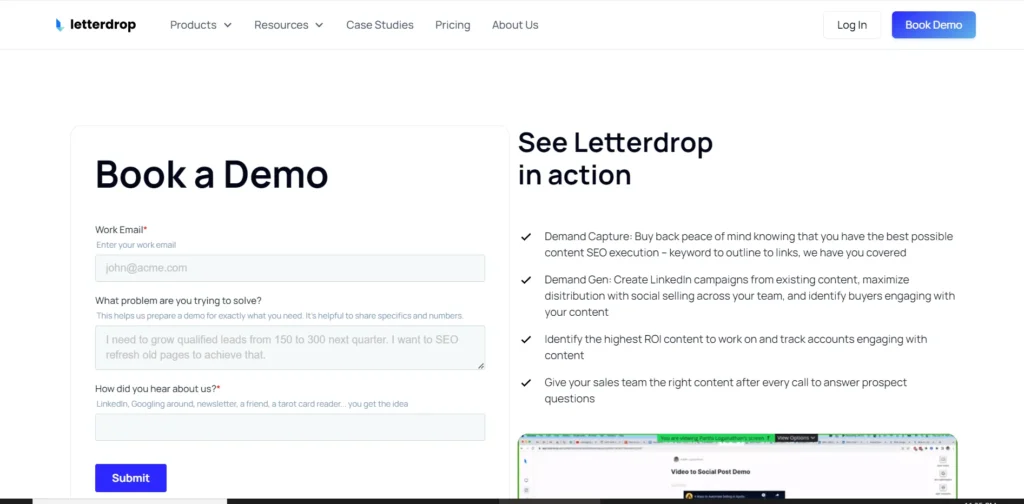
Letterdrop is a company that focuses on helping businesses create and distribute content that drives sales, particularly for B2B marketing. They offer a suite of tools to achieve this:
Focus: B2B Content Marketing & Revenue Growth
Key Features:
- Content Insights: Analyze existing content to understand what’s driving revenue and identify opportunities for improvement.
- Content Creation Tools: Help you brainstorm content ideas, optimize content for SEO, and even create content briefs.
- Distribution Tools: Distribute your content across various channels like social media and email marketing.
- Focus on Organic Growth: Aims to build a sustainable pipeline of leads through organic content marketing efforts.
Pros:
- B2B Content Optimization: Analyzes existing content, identifies what works, and optimizes for better results.
- AI-Powered Assistance (Clearscope): Uses AI to find strong keywords, analyze content, and streamline content creation.
- Targeted B2B Focus: Tailored services to attract qualified leads and align content with sales goals.
- Distribution Expertise: Helps distribute content across effective channels to reach your target audience.
- Data-Driven Approach: Tracks performance and uses insights to refine your strategy for maximum impact.
Cons:
- Unclear Pricing: May require direct contact for a quote.
- Clearscope Reliance: Core content creation might not be included.
- Content Creation Focus: May require additional resources on your end for full content creation.
Who is it for?
B2B marketing teams and businesses looking to leverage content marketing for lead generation and sales growth. It might be a good fit for companies that already have a content creation process in place but want to optimize it for better results.
8. Buzzsumo
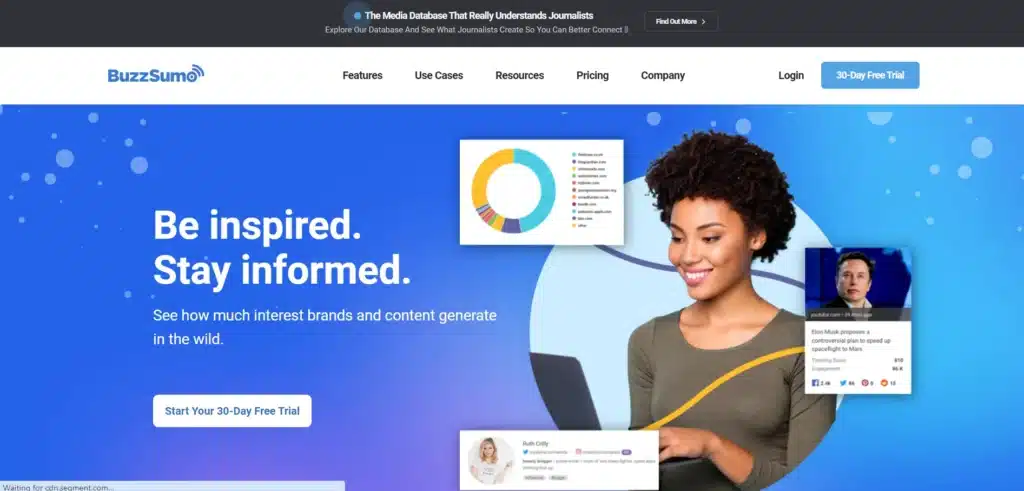
BuzzSumo is a web-based platform designed to empower you with the knowledge of what content performs well online. This makes it a valuable asset for content marketing and SEO strategies.
Focus: Keyword Research
Key Features:
- Content Discovery: Find trending content and topics that resonate with your target audience.
- Influencer Identification: Identify influencers who can amplify your content’s reach.
- Competitive Analysis: See what content performs well for your competitors, gleaning valuable insights.
- Brand Monitoring: Track mentions of your brand or industry online, staying informed about your online presence.
- Content Planning: Gain valuable insights to inform your content strategy and content creation process.
Pros:
- Content Discovery: Uncover trending topics and content styles that resonate with your audience.
- Influencer Identification: Find influencers who can help promote your content and expand your reach.
- Competitive Analysis: Gain valuable insights into what content performs well for your competitors.
- Brand Monitoring: Track mentions of your brand or industry online, staying on top of your online presence.
- Content Planning: Inform your content strategy and creation process with data-driven insights.
- Improves SEO: Helps you optimize content for better search engine visibility by understanding what resonates with audiences.
Cons:
- Limited Free Plan: The free plan offers restricted features. Upgrading to a paid plan is necessary to access most valuable features.
- Focus on Discovery, Not Creation: BuzzSumo excels at finding successful content, but it doesn’t directly create content for you.
- Data Accuracy: While informative, the data BuzzSumo provides may not always be perfectly accurate.
- Learning Curve: Using BuzzSumo effectively might require some time to learn its functionalities and interpret the data.
Who is it for?
- Content creators: Find hot topics & influencers to spread your content.
- SEO & social media: See what ranks & grab shareable content.
- PR & marketing: Track mentions & find press opportunities.
9. AnswerToPublic

Answer the Public Free seo tool to discover user questions and brainstorm content ideas that resonate with your audience.
SEO tool category: Keyword research
Key Features:
- Search Query Exploration: Discover the questions, prepositions (for, with), and comparisons (vs, better than) people use online related to your topic.
Pros:
- Free & Easy to Use: No cost and user-friendly interface make it accessible to anyone.
- Content Brainstorming: Uncover unique angles and user questions to address in your content.
- Improved Audience Targeting: Tailor content to the specific questions your target audience is asking.
Cons:
- Limited SEO Focus: Not an SEO tool in the traditional sense. Doesn’t offer features like keyword research or rank tracking.
- Content Creation Focus: Helps with content ideas, but doesn’t directly create or optimize content.
Who is it for?
- Content Creators: Generate engaging content ideas that directly address user queries.
- SEO Professionals: Gain insights into user intent to inform content strategies.
- Marketers: Understand your target audience’s pain points and questions to craft better marketing messages.
Choosing the Right Tool
There are many SEO tools available, each with its strengths and weaknesses. The best tool for you depends on your specific needs and budget.
In short, SEO tools are your secret weapon for cracking the search engine code and boosting your website’s ranking!


This is a fantastic post, full of useful information and practical tips. Thank you for sharing your knowledge.